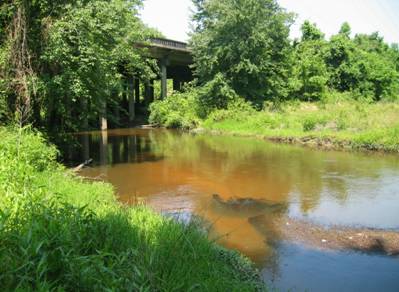Collaboration and Partnerships
Note: EPA no longer updates this information, but it may be useful as a reference or resource.
Watershed Improvement Summary-Lower Horse Creek Watershed (SC)
EPA Region 4 - Atlanta
Geographic location or area of activity: Lower Horse Creek Watershed, Horse Creek Valley, South Carolina
Description of activity: Lower Horse Creek Watershed is historically significant within the southeast, hosting several communities in Horse Creek Valley that flourished as the region became home to the sites of the first large cotton mills in the southeast, beginning in Graniteville in 1845. By the turn of the century, these waters adopted a wintering class of well-to-do northerners and horse riding and golfing became staples. All of the region’s cotton mills are now closed, and their adopted mill towns struggle to maintain sewer collection systems. In addition, significant new development pressures are occurring as the suburbs of Augusta, Georgia, and North Augusta, South Carolina, encroach on pastures and wooded portions of Little and Lower Horse Creek watersheds.
The watershed approach is being applied within a cluster of watersheds within the South Carolina side of the Middle Savannah River Basin. Primary efforts are targeting the Lower Horse Creek watershed with additional maintenance efforts in Little Horse Creek watershed as well as restoration efforts that are beginning in the Middle Horse Creek watershed. According to the South Carolina Department of Health and Environmental Quality (SCDHEC) 2002 list of impaired waters (303(d) list), water quality stations in Little, Middle and Lower Horse Creek watersheds did not meet water quality standards for human contact recreation.
An EPA grant (104(b)(3) grant) to develop pollution allocation plans (TMDLs) was recently implemented by SCDHEC. SCDHEC has taken a lead role in beginning the restoration planning process. SCDHEC field personnel have been readily characterizing local sources of pollution and mitigating sanitary sewer overflows. SCDHEC regional field office personnel detected at least 5 significant sanitary sewer overflows that were likely impacting fecal coliform concentrations at stations SV-072 and SV-250 in Horse Creek. The Southeast Natural Sciences Academy, a non-profit local collaborator, conducted an additional 104b3 study. As a part of this grant its organization conducted intensive monitoring for pathogens in Horse Creek under a wide variety of hydrologic conditions to bolster ongoing State monitoring. Local governments (City of North Augusta and Aiken County) have also assumed key roles through stormwater management activities. An EPA non-point source grant (319 grant) has been issued to Clemson University Extension Service to lead efforts to mitigate additional non-point sources of pollution and the watershed approach is being applied in conjunction with this grant to help identify and mitigate pathogen sources and to manage and control significant growth and land-use change.
Significant public outreach components of the grant are anticipated to bolster the watershed approach as local stormwater managers will work closely with regulatory and voluntary entities to manage water quality, sustain water quality improvement, and promote sustainable development within rapidly urbanizing portions of the watersheds. Local governments frequently collaborate to address pathogen sources. Significant public outreach and involvement through the municipal separate storm sewer systems (MS4) requirements as well as the 319 grant implementation will build sustainability into the watershed restoration approach being employed in this basin.

Lower Horse Creek
Local partners: South Carolina Department of Health and Environmental Control; South Carolina Department of Health and Environmental Control; Southeast Natural Sciences Academy; City of North Augusta and Aiken County; Clemson University Extension Service
Activity URLs: http://www.scdhec.net/environment/water/npspage.htm
http://www.scdhec.net/environment/water/grants.htm
![[logo] US EPA](../gif/logo_epaseal.gif)